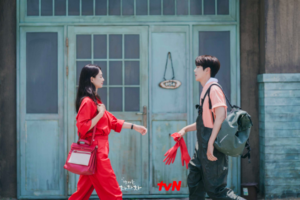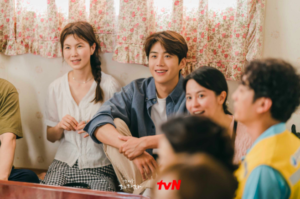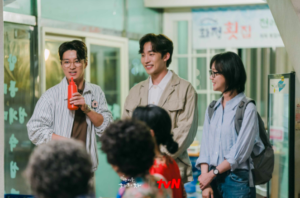
Based on its description, laidback romance drama Hometown Cha-Cha-Cha was brimming with promise right from the start. With the leading dimpled duo of big city dentist Yoon Hye-jin (Shin Min-ah) and small town born and bred “Chief” Hong Du-sik (Kim Seon-ho) fated to fall in love, the seaside town of Gongjin as the drama’s picturesque backdrop, and a crew of quirky town-dwellers each with their own heartwarming and sometimes heartbreaking stories to buffer the show’s mostly mundane plot, the tvN drama has and had all the makings of a hit show — naturally, reflected in its high ratings and popular online presence.
This review contains spoilers.
As such, the drama starts off strongly, and with a whole load of charm. When Hye-jin, a Seoul-based dentist, quits her job after a major disagreement with the head of her practice and is unable to find any other work in Seoul, she finds a possible chance at a new life and career in Gongjin, a place she only briefly visited as a child with her late mother. While sitting on the beach she only once frolicked on when she was younger, her brand new designer shoes get caught by a wave and wash into the ocean. Hong Du-sik, the town’s chief (called “Chief Hong” by the town residents), finds one of her shoes in the midst of his surfing session, then silently returns it to her (and some bathroom slippers from the local fish restaurant to tide her over while she searches for her other shoe) when he steps out of the water. And so, funnily enough, their fateful romance begins.
Although Hometown Cha-Cha-Cha, and Kim Seon-ho’s character, have found themselves colored by the actor’s recent accusations by his ex-girlfriend regarding dating abuse within their relationship, it’s nearly impossible to not argue that one of the drama’s main drawing points is Du-sik’s characterization. A jack of all trades, and seemingly a master of all too, Du-sik is the ideal “every man.” Gongjin is his hometown — hence the name of the show — and he’s the seaside town’s go-to guy. When anything at all needs fixing, he’s the one the local residents call. He’s good with his hands, frugal, practical, and kind-hearted, putting the town dwellers’ needs above his own 100% of the time.
The mundaneness and surface-level simplicity of Du-sik’s character is what makes him especially alluring, thanks to writing by Shin Ha-eun. Although he’s merely a character in a drama, his small-town, boyish charm (with a bit of a troubled past) makes him seem more attainable to viewers. He’s initially not the type of romantic partner Hye-jin wants, but it’s obvious that she will, and must come around.
The same goes for Du-sik’s budding romance with Hye-jin. While Hye-jin’s characterization is a bit weaker than Du-sik’s — the writers don’t go into her backstory nearly as much — their relationship also basks in and portrays its warmth through the pair’s most mundane moments together. At the start of the show, it’s the smaller moments that best reflect their initial tension and eventual attraction toward one another — i.e. Du-sik finding and returning Hye-jin’s second missing shoe, the two sharing one of Du-sik’s natural wines and Hye-jin worrying about her face getting hot (followed by Du-sik tenderly holding her cheeks to check), and other small tiffs the two get into that ultimately make viewers swoon.

The writers also portray their initial conflicts and misunderstandings with one another as a result of their differing backgrounds, which turns out to be the main overarching storyline for the first half of the series. Hye-jin is an outwardly cool, city girl who can’t seem to understand Du-sik’s niceties and services toward the rest of the town, plus his insistence on being paid minimum wage. Meanwhile, Du-sik can’t understand why Hye-jin must be “so” high maintenance, and why she can’t understand his insistence on being paid minimum wage.
Their dialogue during these misunderstandings is what makes their tension, chemistry, and romance together so palpable and believable, in addition to the two’s acting. For the most part, until around the halfway mark when their misunderstandings mostly disappear, they fuel the drama’s realistic tone against the backdrop of its idyllic seaside setting.
The drama also thrives in the mundanity and everyday incidents that happen within Gongjin and between its residents, which often serve to buffer its laidback and somewhat idle plot. As it’s revealed the Du-sik was more or less raised by Gongjin’s residents, namely Gam-ri (Kim Young-ok), as his parents and grandfather died when he was very young, it becomes apparent that each of the town’s quirky residents and side characters are pieces of the puzzle that make up Du-sik and who he is.

The plot between these alluring supporting characters and their own narratives speeds up when Hye-jin’s college senior (sunbae) and now-variety show PD Ji Seyong-hyun (Lee Sang-yi) unexpectedly arrives in Gongjin to film a food-oriented variety show starring members fictional K-pop boy group DOS. The writers treat Seyong-hyun’s storyline ideally as the second male lead, never overextending his pursuit of Hye-jin past the point where it feels like they’re drawing it out merely for the purpose of adding additional plot.
Where the drama falters, however, in dealing with both its leads and supporting characters, is when the writers attempt to pack in too much action into the otherwise purposefully mundane plot. Hometown Cha-Cha-Cha is surely at its best when it sticks to its original easy-going and laidback tone and mood that it first established at its beginning. Some town residents’ backstories are arguably explored almost too in-depth. Or, when the attempt is made to do so, the writers falter at the execution.
For example, the love triangle that ensues between divorcées Yeo Hwa-jeong (Lee Bong-ryun) and Jang Yeong-guk (In Gyo-jin), plus Gongjin teacher and Yeong-guk’s first love Yu Cho-hui (Hong Ji-hee) is drawn out to an unnecessary point. Through flashback scenes between the trio, it is implied and ultimately revealed that Cho-hui originally had feelings for fish restaurant owner Hwa-jeong, and not Yeong-guk, as audiences and Yeong-guk himself originally expected. The bonus of a female-female romance is an interesting aspect for a drama of this nature, but is hammered through to audiences almost too much when the writers include Cho-hui confessing to both that she actually once had feelings for Hwa-jeong at the very end of the series.

The same issues of packing too much drama and action into a short amount of time, or just simply to an unnecessary degree, also come to a head at Cha-Cha-Cha’s halfway point when a kidnapper and robber suddenly threatens the safety of the town. The robber ultimately breaks into Hye-jin’s house, and luckily enough, Du-sik finds himself there at the perfect time to come to her rescue. The scene is portrayed too dramatically to match the tone of the rest of the drama, and feels thrown into the plot out of nowhere merely to propel the narrative forward in any way. Sure, it’s to be expected that something outlandish and surprising may happen like this in a small, almost mystic town where “nothing” else happens, but it feels out of place for where Du-sik and Hye-jin’s relationship is at that point in the series.
The most obvious point in which Hometown Cha-Cha-Cha strays too far from its original intended purpose and tone comes in the final few episodes, when the big mystery of the drama, and of Du-sik himself, is finally revealed — why he disappeared to Seoul from Gongjin for five years. The writers seek to pack most, if not all, of this information just into episode 15. What happens to Du-sik during these mysterious five years is over-the-top, and hardly realistic, especially in comparison to the passive plot that transpires for most of the rest of the show. However, the writers make an earnest and well-intended attempt at exploring themes of grief and guilt — and for the most part do so successfully, at least in comparison to other romantic dramas. The drama’s actors especially drive these points home, skillfully portraying and emulating these nuanced emotions on screen.

Despite unexpected results and after effects, Hometown Cha-Cha-Cha was made in earnest, and made to be earnest, and its ultimate end product reflects that intent soundly. Without being too predictable and too in tune with the overly tropey, overdone grain of other classic romance dramas, Hometown Cha-Cha-Cha leaves a lasting legacy as a mostly healing, pleasant watch for new and old drama fans alike.
(Nielsen Korea. Korea JoongAng Daily. Images via tvN.)


